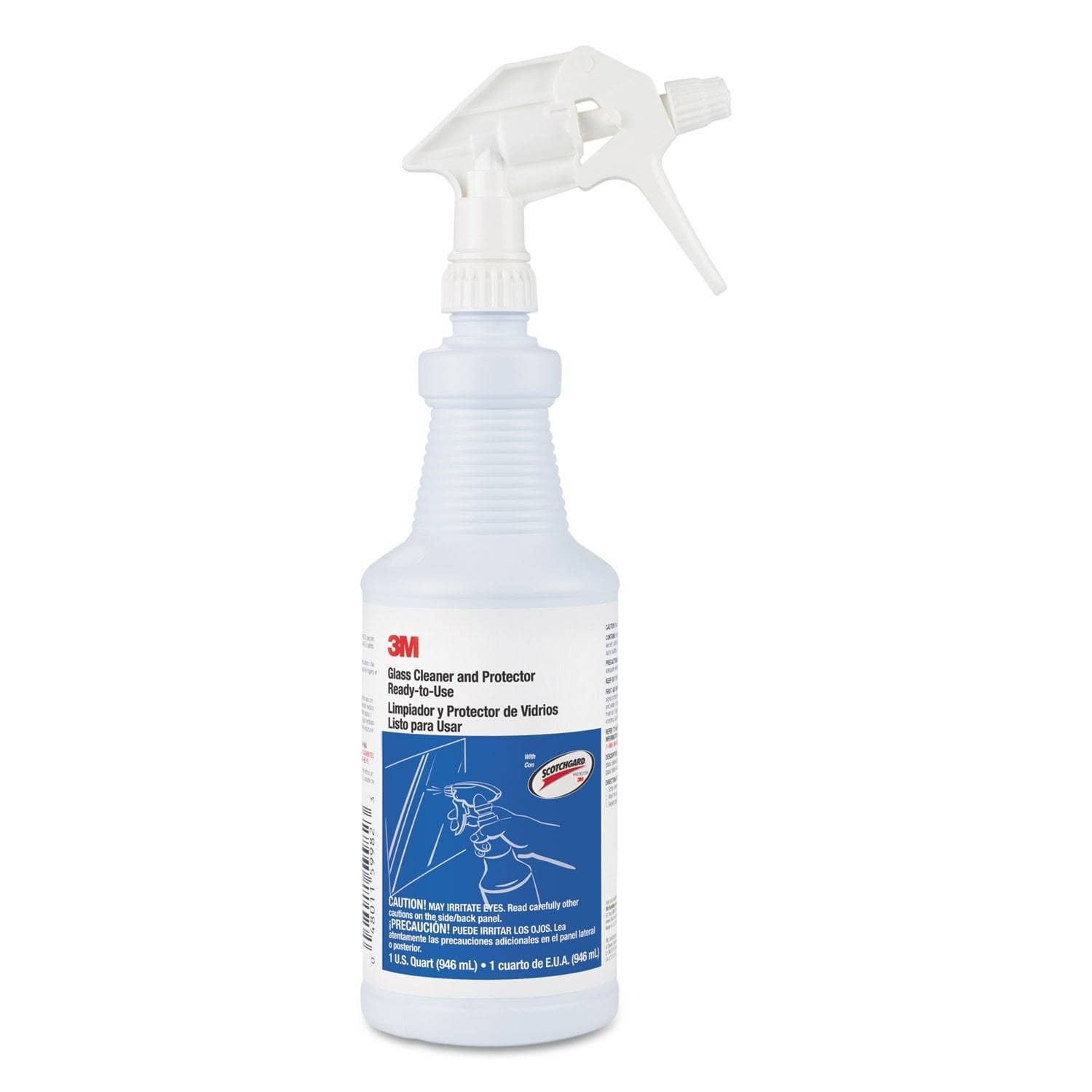

3M Ready-To-Use Glass Cleaner With Scotchgard, Apple Scent, 32Oz Spray Bottle - MMM85788
- Not only cleans, but also makes glass easier to clean over time.
- Works like a heavy-duty glass cleaner without the high levels of solvent or ammonia.
- Cleans and protects glass and other silica-based surfaces like uncoated granite, ceramic and porcelain.
- Repeated usage creates a layer of Scotchgard protection, making glass easier to clean over time.
- Fast-drying and streak-free.
- Also cleans but may not protect other surfaces such as stainless steel, chrome, aluminum, plastic, acrylic glass, and more.
- Keeps glass looking clean longer.
- Ready to use.
Leaves an invisible layer of protection on glass and uncoated granite, ceramic and porcelain, making these surfaces easier to clean after routine use. Scotchgard Protection also helps reduce fogging on windows and mirrors with repeated use, leaving glass with an attractive shine. Also cleans (but may not protect) other hard surfaces like stainless steel, chrome, aluminum, ceramic, plastic, acrylic plastic, desks, walls and other common nonporous surfaces. This versatile cleaner removes dirt, greases and oils from hard washable surfaces. Not for use on direct food contact surfaces, vehicles, inside aquariums, eyewear or porous surfaces. Formula has less than 0.1% VOC. US patent pending. Application: Glass Cleaner; Applicable Material: Windows; Mirrors; Stainless Steel; Chrome; Silica-based Surfaces; Uncoated Granite; Ceramic; Porcelain; Chemical Compound: Non-ionic Surfactants (NJTSRN 04499600-6633); Isopropyl Alcohol; Ethoxylated C9-11 Alcohols; Dirt Types: Dirt; Fingerprints; Grease; Ink; Lipstick; Marker; Oil.
HURRY UP! THE SALE IS AVAILABLE IN:

Free Shipping

Free Returning

Support 24/7
UNIQUE SELLING POINT
The unique selling proposition (USP) or unique selling point is a marketing concept first proposed as a theory to explain a pattern in successful advertising campaigns of the early 1940s. The USP states that such campaigns made unique propositions to customers that convinced them to switch brands. The term was developed by television advertising pioneer Rosser Reeves of Ted Bates & Company. Theodore Levitt, a professor at Harvard Business School, suggested that, "Differentiation is one of the most important strategic and tactical activities in which companies must constantly engage. The term has been used to describe one's "personal brand"; in the marketplace. Today, the term is used in other fields or just casually to refer to any aspect of an object that differentiates it from similar objects.




OUR PROMISE
A money-back guarantee, also known as a satisfaction guarantee, is essentially a simple guarantee that, if a buyer is not satisfied with a product or service, a refund will be made.
The 18th century entrepreneur Josiah Wedgwood pioneered many of the marketing strategies used today, including the satisfaction-or-money-back guarantee on the entire range of his pottery products. He took advantage of his guarantee offer to send his products to rich clientele across Europe unsolicited. The money-back guarantee was also a major tool of early U.S. mail order sales pioneers in the United States such as Richard Sears and Powel Crosley Jr. to win the confidence of consumers.

Kate Perarad
CEO of Piggy
In promotion and of advertising, a testimonial or show consists of a person's written or spoken statement extolling the virtue of a product. The term "testimonial" most commonly applies to the sales-pitches attributed to ordinary citizens, whereas the word "endorsement" usually applies to pitches by celebrities. Testimonials can be part of communal marketing. Sometimes, the cartoon character can be a testimonial in a commercial.

Victor Bui
CEO of BraveBits
In promotion and of advertising, a testimonial or show consists of a person's written or spoken statement extolling the virtue of a product. The term "testimonial" most commonly applies to the sales-pitches attributed to ordinary citizens, whereas the word "endorsement" usually applies to pitches by celebrities. Testimonials can be part of communal marketing. Sometimes, the cartoon character can be a testimonial in a commercial.

Richard Nguyen
CEO of PageFly
In promotion and of advertising, a testimonial or show consists of a person's written or spoken statement extolling the virtue of a product. The term "testimonial" most commonly applies to the sales-pitches attributed to ordinary citizens, whereas the word "endorsement" usually applies to pitches by celebrities. Testimonials can be part of communal marketing. Sometimes, the cartoon character can be a testimonial in a commercial.
HURRY UP! GRAB YOUR CHANCE NOW

WE ACCEPT








